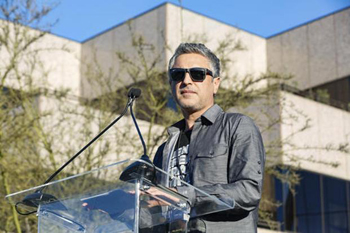Washington, Mar 6: A number of Hindu Americans were up in arms against CNN for airing a show which they alleged portrays Hinduism in a negative light. 'Believer with Reza Aslan', a six-episode "spiritual adventures series", was premiered yesterday. The show explores the facts and myths behind the Aghori, a mystical Hindu sect known for extreme rituals.
 Eminent Indian American Shalabh Kumar, a top supporter of the US President Donald Trump said, "this is a disgusting attack on Hinduism." In a tweet, Kumar said, "Hinduism has been attacked because a large number of Hindu Americans supported Trump during the election campaign."
Eminent Indian American Shalabh Kumar, a top supporter of the US President Donald Trump said, "this is a disgusting attack on Hinduism." In a tweet, Kumar said, "Hinduism has been attacked because a large number of Hindu Americans supported Trump during the election campaign."
"I condemn @rezaaslan, CNN for airing Believer with fiction. Disgusting attack on Hindus for supporting @POTUS @stephenkbannon @newtgingrich," Kumar, also the founder of Republican Hindu Coalition said in a tweet. A host of individuals and organisations joined him against the CNN show.
"When we are witnessing intolerant attacks on minorities, telecasting this serial will add more misrepresentation, bias and may lead more hate crimes," said Khanderao Kand, a community leader who had initiated efforts to eradicate misrepresentation of Hinduism in California text books in 2004.
"With multiple reports of hate-fuelled attacks against people of Indian origin from across the US, the show characterises Hinduism as cannibalistic, which is a bizarre way of looking at the third largest religion in the world," US India Political Action Committee (USINPAC) said in a statement.
It urged CNN to stop the show from being aired at the night. "We are very disappointed. This is an issue that is of deep concern to the Indian American community evidenced by the large number of calls/emails we have received. In a charged environment, a show like this can create a perception about Indian Americans which could make them more vulnerable to further attacks," said USINPAC chairman Sanjay Puri. CNN's "Believer with Reza Aslan" show promotes xenophobia and Hinduphobia, alleged Ajay Shah of American Hindus Against Defamation.





Comments
Add new comment